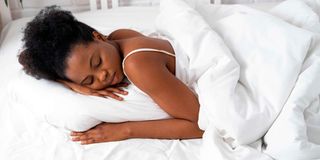How ditching my phone at night improved my sleep

A young woman sleeps in her bed.
What you need to know:
- Scientists say that the blue light from phones is especially disruptive if you’re trying to fall asleep and can mess up sleep patterns.
- I am living proof that the research method they used to arrive at that conclusion was correct.
- The more I stare at my phone at bedtime, the harder it becomes to fall asleep.
I recently surprised a colleague when I told him I own an alarm clock. To ensure I resist the temptation to snooze my alarm in the morning, the clock stays in my study area, a good distance from my bed. This means that I have to take at least five steps to reach and turn it off.
“I learned this trick somewhere on the Internet—I think it was a fun video on Instagram. When you have to get out of bed to turn off the alarm, you're unlikely to go back to bed," I said, feeling proud of my discipline.
That was until Kibz stopped me in my tracks. “But why do you need an alarm clock?” he asked.
Without him giving further details, I knew he was referring to the fact that I have an alarm on my phone, so why did I possibly need a standalone alarm device?
It is true that I have an alarm on my phone. In fact, for a long time, I relied on it. However, I realised that keeping my phone next to me at bedtime "because I use it as an alarm" was merely an excuse to stay on TikTok until ungodly hours. It only took stretching out my hand to have the phone and continue my mostly aimless scrolling. The effects of inadequate sleep were always there for me in the morning.
When I took a long, hard look at my life, I realised that my phone usage, particularly for no good reason just before bed, was a big issue. Scientists say that the blue light from phones is especially disruptive if you’re trying to fall asleep and can mess up sleep patterns. I am living proof that the research method they used to arrive at that conclusion was correct. The more I stare at my phone at bedtime, the harder it becomes to fall asleep.
In my wild search for a solution, I remembered the saying, "out of sight, out of mind." To reclaim my wholesome sleep, I needed to keep my phone out of sight at bedtime. I applied this by ensuring that once I clock out for the day, I do not need my phone for anything. That was how I started building the discipline of keeping my phone out of sight at bedtime by buying an alarm clock. It gives me the freedom to keep my phone out of my bedroom. This also ensures I do not find myself locked into playing a phone game, competing with people I do not know, and for a reward that has no real value in the middle of the night.
I explained all this to Kibz, but I could tell from his expression that he had no idea why I couldn’t simply put my phone aside and go to sleep.
Just before I resigned to the possibility that I am the only person who has to use extreme tactics to manage phone usage at bedtime, my friend Helen texted.
"I noticed I was so distracted with my phone this month. It affected my prayer, study life, sleep pattern, and movie schedule. I am embarking on a one-week phone fast. I will put it in my suitcase and store the suitcase at the top of my wardrobe. If it's in the bedside drawer, I’ll go back to it," her message read in part.
While I applauded her decision, I was still sad that for the entire week, I would not reach her by phone and she would be unavailable for our regular evening chats on WhatsApp. However, her message and the conversation we had afterward validated the fact that I am not the only one who has had to take drastic measures to avoid phone distractions.
Phone addictions and distractions are real, and what makes them even more dangerous is that they are socially acceptable. Unlike addictions such as alcohol, which easily becomes noticeable to others and thus easily get nipped in the bud, we could be far gone before we begin to actively seek solutions to excessive phone usage.
On a scale of one to 10, how would you rate your relationship with your phone?
The writer is the Research & Impact Editor, NMG ([email protected]).





